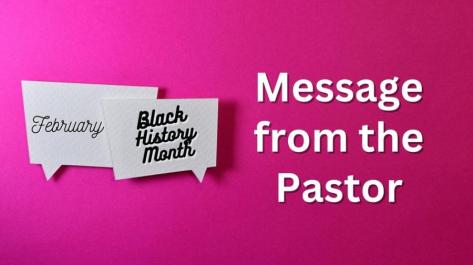February is Black History Month

February is Black History Month. As Methodists, we have an astonishing array of Black saints to lift up without even leaving the sanctuary of our own tradition: Harriet Tubman! John Lewis! Ellen Sirleaf Johnson! Rosa Parks! Joseph Lowery! We can and should be humbled by the names we can claim as "ours," singing the same hymns, sharing the same baptism, and proclaiming the same prevenient, justifying, and sanctifying grace at work in the world.
Before we become too self-congratulatory, though, each of these names is connected to stories that paint a broader, less joyful picture.
Harriet Tubman freed hundreds of slaves. . .some of whom were enslaved by plantation owners who also worshipped at Methodist churches.
John Lewis was a hero of the Civil Rights Movement to end segregationist policies. . .policies which some white Methodists were all too happy to fight for to keep in place.
Ellen Sirleaf Johnson was the first woman president of Liberia coming out of a horrific and bloody civil war. . .which came about in part because Liberia was colonized by formerly enslaved people from the US, an effort supported by some Methodists who wanted to establish a "civilized" Black nation on the African continent, quite ignorant of the indigenous folks already living in the area.
Rosa Parks walked into the history books by sitting down on a Montgomery bus. . .and she was booked by Deputy Sheriff DH Lackey, who worshipped at an all-white Methodist church.
Joseph Lowery's leadership in the Civil Rights Movement earned him honorary degrees from a number of historically Black colleges and universities. . .which came into existence precisely because of strong opposition, including from Methodists, to integrated higher education.
Maybe you were around when some of these stories were happening in real time. How did the televised news and local newspapers cover these events? What did you make of them? And what do they mean to you now?
These last 3 years have taught us the unfinished nature of racial reconciliation. We often think of "reconciliation" as a matter between people or groups of people to resolve a conflict, but I think about it in terms of bank statements. Online banking has changed some of these practices, but when the bank sends statements at the end of the month, we check our checkbook entries against the bank statement numbers, note any discrepancies, and we either call the bank or correct our own accounting. "Reconciliation," in this sense, is checking our own math against what the bank says. Reconciling ensures we have an accurate picture of debits and credits so we don't overspend.
Black history month, in this sense, is an opportunity for us to check the bank statement against what we think we have in our account, but this time in the sense of history. Does the story go entirely the way we thought it did? Is it possible we wrote a check and forgot to enter it, and now we need to take a look at what actually happened? Are there any errors in the record that need correcting? What is actually in our account?
This is good and holy work, uncomfortable as it is. On Sunday mornings, occasionally someone will offer me a note on something I said that was hurtful, whether intentional or not. I never love these moments, but each time is a chance to make things right, or even better, to make things good. Repentance and reconciliation always go together. Ministry worthy of the tradition of Harriet, John, Ellen, Rosa, and Joseph inevitably leads us back to the sanctuary to sing God's praise for how far we have come by faith, leaning on the Lord. It is only grace that will lead us home to each other.
Blessings, Rachel
